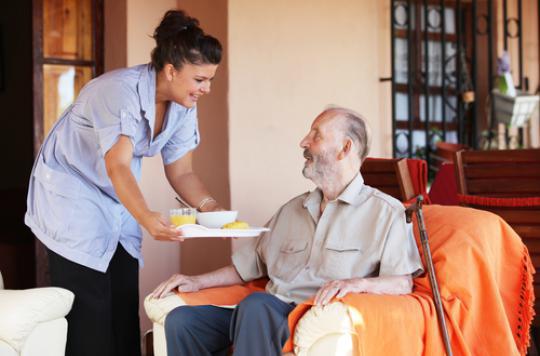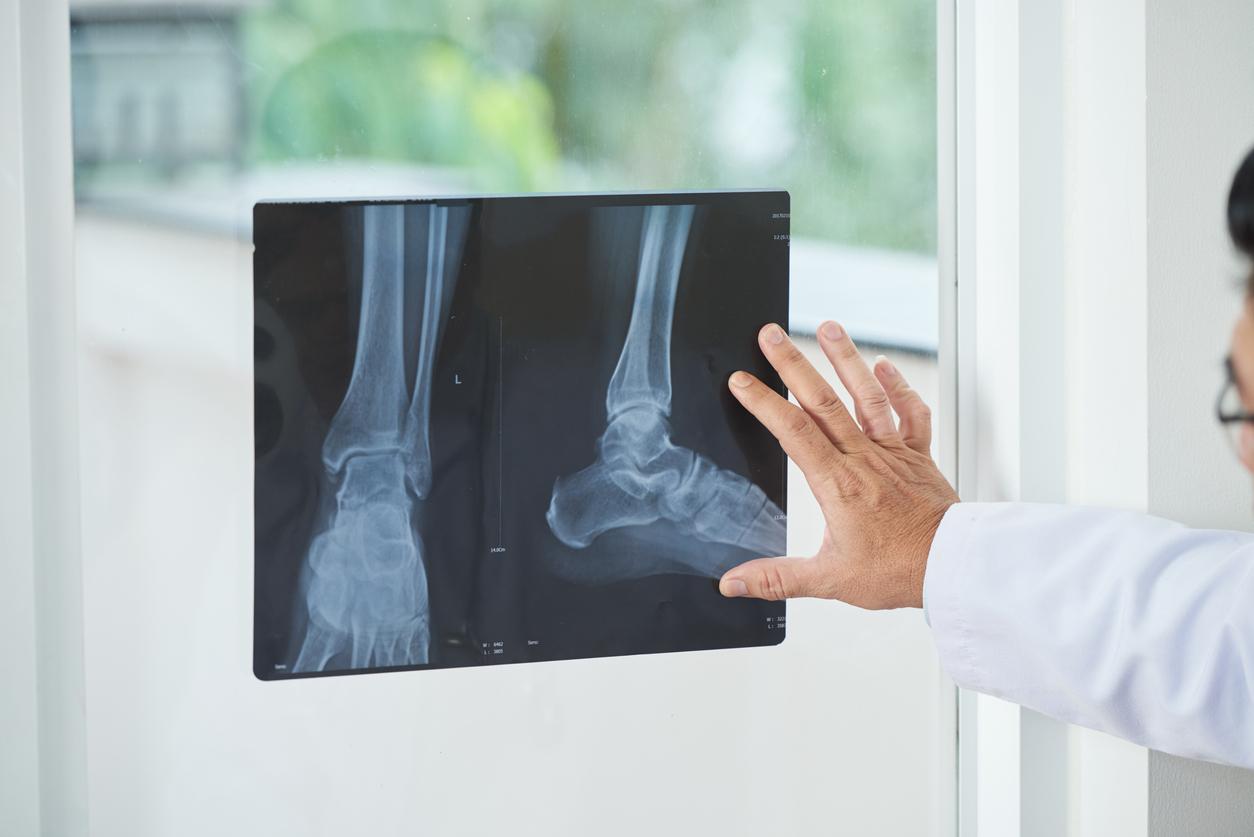France is aging but at the dawn of the presidential election, the loss of autonomy is on the sidelines of the debates. More than a million seniors are however in a situation of dependency. Daily aid is expensive, for the State and for families: 34 billion euros are needed each year for their support.


This week, Timothée Morteau has an appointment with his bank. Almost every month, his accounts end up in the red. “I’m caught by the throat,” blows this retiree from Noisy-le-Grand (Seine-Saint-Denis). Blame it on a small pension and exorbitant fees. Because Timothée had no choice: he had to place his wife, suffering from Alzheimer’s, in an establishment for dependent elderly people (EHPAD), after having helped her at home. “It was so difficult to live with that I almost jumped out of the window once,” said the 85-year-old. And his case is unfortunately not isolated. Like Timothée Morteau, one in two French people takes care of, or has taken care of, an elderly relative in a situation of dependency.
20% of the elderly
A dependent person is defined, according to the terms of the law, by his need for assistance in “essential acts of life” or for regular supervision. In fact, it only concerns the elderly. As proof, the personalized autonomy allowance (APA) is only available after 60 years.
According to INSEE, the average age of entry into dependency is 83 years for women, 78 years for men. But “80% of the over 80s have no problem of disability or fragility”, underlines Pascal Champvert, president of AD-PA (Association of Directors at the service of the Elderly). This does not prevent the statistics from climbing rapidly. A little over a million people benefit from the corresponding aid. But the triple would be in a situation of loss of autonomy.
Insufficient financial aid
Support goes without saying for many caregivers. However, it is not easy. Including financially. In fact, addiction is expensive. Each year, it represents 34 billion euros of expenditure – including a significant part at the expense of families. In fact, families must take out of their pocket 400 to 2300 euros per month to finance the care of their loved one with loss of autonomy, according to estimates by INSEE. This charge weighs heavily on the portfolios and also on the morale of families. “The amounts I still have to pay are very high,” confirms Timothée Morteau. It’s hard for me to make ends meet. “
Timothée Morteau, retired and carer: ” A nurse came to assess the APA. It was useful to me at first but Marie-Joseph and I both have a little retreat. “
Several possible help
The financial support exist for the French in a situation of dependency. The personalized autonomy allowance (APA) is available without means test and the amount changes according to the level of disability, assessed by the AGGIR scale, which ranges from 1 to 6. There are also various aids allocated according to the level of disability. income, at the level of the departments, of the national old-age insurance fund (CNAV) or complementary ones.
The latest breakthrough in the sector is included in the law on the adaptation of society to aging. It adds respite assistance of up to 500 euros, available to caregivers. An evolution tempered by Joël Jaouen, president of the France Alzheimer association. “When you read the text, you understand that not everyone will be eligible,” he moderates. It is granted on condition that no replacement solution has been found. “
The cost of institutions
At the heart of the expenses, the accommodation costs. For Timothé, the placement of his wife in EHPAD was saving but also very expensive. Each month, he must pay 1,500 euros to pay for the room and the support of his spouse. A residence in EHPAD causes on average an out-of-pocket expense of 1,700 to 2,200 euros… with strong variations depending on the department. “In the south of Hauts-de-Seine, where I live, a day in an establishment costs 103 euros, illustrates Danielle Rollat, national vice-president of Ensemble et solidaires – UNRPA. My sister lives in the Allier, where a day represents 60 euros. “
These high costs undoubtedly explain why the French are so reluctant to be placed in EHPAD. Eight out of ten opt for home support, according to the Dependency Barometer 2016. Almost as many consider specialized residency as a last resort. This is the case with Olof Edstrom. This Parisian resident chose to train to accompany his wife at home. “I have launched a file for accommodation in an institution, if his condition worsens or something happens to me,” he explains.
Olof Edstrom, retired and carer: ” I searched the internet and found a seminar. My wife’s condition worsened but we had a lot of activities together. “
Inefficient alternatives
Home care for dependent elderly people is by far a preferred solution. Both the French and the public authorities, who have strengthened the measures promoting this option in the law on the adaptation of society to aging. In the eyes of Pascal Champvert, it is above all a way of concealing the problem. “Once people are at home, how do you support them? Should the establishments be abolished? These formulas hide the fact that politicians have not worked on the file ”, plague the president of the AD-PA.
Especially since home support rarely matches the well-oiled mechanics of the Edstrom couple. On average, health and paramedical professionals are present for 56 hours per month with the beneficiary, according to a survey by UFC-What to Choose. Largely insufficient in the eyes of Danielle Rollat. “Home care is not from Monday to Friday, 9 am to 6 pm. It is also Saturday, Sunday, at night, she emphasizes. The problem is, the services are bloodless. »Develop the workforce, only two presidential candidates propose it: Benoît Hamon and Nicolas Dupont-Aignan.
The silence of the public authorities
To these multiple dysfunctions, the public authorities respond with deafening silence. However, “it is a major democratic and social stake”, estimates Pascal Champvert. Quiet, but not without promise. The candidates elected to the presidency Nicolas Sarkozy (LR) and François Hollande (PS) have successively advanced the same commitment: the creation of an autonomy service. Nice words since nothing has been done. “When two successive presidents commit, when the company indicates how to finance it, it must be done”, urges Pascal Champvert. However, the law of adaptation of society to aging finally voted does not convince more patients and professionals.
Pascal Champvert, president of the AD-PA: ” It is a small law, funded to the tune of 650 million euros. It is very little and the few measures are financed by CASA. She’s stuck today. “
“Active solidarity must develop for these people,” believes Danielle Rollat. This is also the opinion of the president of France Alzheimer. “The creation of a fifth branch is a battle that we have been waging for a long time,” emphasizes Joël Jaouen. This would make it possible to take charge of the need for support. “(see the rest of our survey)
But a wider range of solutions is being deployed, such as the training of caregivers and the creation of respite structures. Thus, 37% of French people plead in favor of the opening of day reception centers. To pay for these investments, they designate as a priority the State and contributions. Social VAT, inheritance tax… all avenues are open.
The proposals of the presidential candidates
The contenders for the 2017 presidency are no more talkative than the public authorities on the issue of dependency. Some still put forward some proposals. On the extreme side, Jean-Luc Mélenchon proposes raising the APA ceilings, and Nicolas Dupont-Aignan positions himself in favor of investment in training and adaptation of existing establishments. Marine Le Pen, for her part, is advancing the creation of a fifth risk in Social Security (see the rest of our survey). The president of the National Front has a hollow nose. This solution is rightly acclaimed by representatives of establishments and home services as well as patient associations. UNRPA clearly supports such a measure. On one condition: that it is open to all people with a loss of autonomy, and not only the elderly.
.

















